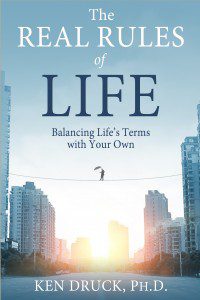 Resilience is a quality that can help you get through life better. Tht’s why I”m happy to have Ken Druck, Ph.D., as my uest today. He’s the founder of The Jenna Druck Center in San Diego, a renowned resilience expert, organizational consultant, and award-winning author of several books including, The Real Rules of Life (Hay House). Here’s what he has to say.
Resilience is a quality that can help you get through life better. Tht’s why I”m happy to have Ken Druck, Ph.D., as my uest today. He’s the founder of The Jenna Druck Center in San Diego, a renowned resilience expert, organizational consultant, and award-winning author of several books including, The Real Rules of Life (Hay House). Here’s what he has to say.
7 Steps to a More Resilient You
by Dr. Ken Druck
Contrary to popular opinion, most of us don’t “bounce back” after getting knocked down. We might want to get back up from the death of a loved one, job loss, serious illness, divorce, traumatic experience, financial setback, addiction or alcoholism as quickly as possible. After all, resilience is in our DNA. But rising out of the ashes of “Plan A” is not always easy or simple. Those who pressure, scare and/or guilt themselves into setting unrealistic expectations and who bully themselves into delivering on them, are destined for failure. 
Facing into a serious health, relationship or job-related challenge is best achieved by following these 7 steps for becoming more resilient.
1. Lead with Self-Care and Compassion Kindness towards self is where resilience begins. Cultivating a voice of self-compassion, love, understanding, self-respect, courage and faith with which to encourage ourselves may take some practice — especially for those of us who have learned to be overly self-critical. Treating ourselves with kindness during or after a rough stretch or setback sets the stage for a journey of almost any length and difficulty.
2. Make Peace with Patience: It’s going to take as Long as it takes. Since none of us has a crystal ball, and healing can be a long and winding road, why not set our expectations on “realistic”? Telling yourself, “I’ll do my best to recover but this is going to take as long as it takes” is a wise game plan based on learned patience. Coming to terms with life’s timetable for healing and recovery, however humbling, is another key element of resilience.
3. Get Used to The Idea of a “New Normal.” Comparing ourselves to the way we used to be (i.e. rich, beautiful, famous, powerful), measuring our self-worth on who we used to be and/or searching to restore the past (i.e. “old normal”) are formulas for self-induced suffering. Living in the “new normal” (i.e. how things are now) is a tough by effective strategy for cultivating resilience. It’s OK to grieve the positive past, process feelings like sorrow, anger and confusion and let go of how things used to be.
4. Devote Yourself: Do What it Takes to Heal. Do whatever it takes to recover and restore your strength. Stubbornly resisting, fighting, denying, procrastinating, avoiding and/or giving up are, on the other hand, sure-fire ways of prolonging our suffering. Stay open and flexible to new things that might have a positive effect on you, like support groups, acupuncture, going for long walks, yoga, eating better (including nutritional supplements), expressive arts, and give them a try.
5. Bolster Your Mental Fitness and Resistance to Stress/Change. Getting in game shape for a comeback means upgrading your level of mind-body-spirit fitness. Regular workouts, daily meditation and/or prayer, counseling, nurturing time with friends and family, pampering, reading success stories and routine health regimens strengthen our minds, bodies and spirit, build our resistance to stress, adversity and change — and make us more resilient.
6. Allow Yourself to Relax About What’s Happening to you. Pushing the “chill” rather than “panic” button allows us to divert psychological strength/energy from deficit and defense spending to matters of self-renewal, health and resilience. This may be easier said than done — in which case you might want to take a deep breath, do the very best you can each day. Do your best to see the big picture. Don’t get so caught up in the “small stuff.” Counting failures and disappointments, rather than gifts, blessings and simple joys, darkens our world. Resilience is the light we’re willing to find even in our darkest hours. Keep the faith.
7. Surround Yourself with Love and Support. Caring, trustworthy friends, family, co-workers and members of support communities (including online) can make all the difference in helping us survive life’s toughest challenges. The smallest doses of good listening, encouragement, affection, kindness, humor and lightheartedness make a big difference. Sadly, “help” is still the least utilized four-letter word in the English language and some of us have trouble asking for it.
The keys to becoming more resilient are faith, patience and courage. Do your best to heal and recover. Fight your way back into life with fierce determination. Balance it with self-care and compassion. Grieve and vent when you need to. Summon the courage to face a new day. Surround yourself with love and support. And make the best of your new normal. The more resilient you is a kinder, humbler, more patient and courageous version of the old you.
**************
Check out Ken Druck‘s book, The Real Rules of Life.
**************
Join the Self-Love Movement™! Take the 31 Days of Self-Love Commitment and get my book, How Do I Love Me? Let Me Count the Ways for free at http://howdoiloveme.com. Read my 2013 31 Days of Self-Love Posts HERE. Join the Self-Love Movement™! on Facebook.
Please leave comments under my posts so we can stay connected.

